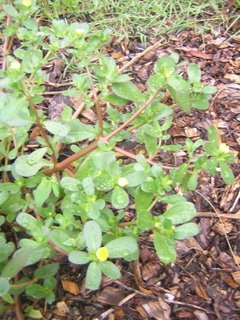 This Common Pursulane (Portulaca oleracea) has sprouted with vigor at the edge of the yard near the paved alley road. Its relatives are everywhere. It is perhaps the most common plant the world over. Researchers have indentified twenty-six different local names for this species, including Ngaglug in the Philipines, Farfena in Oman, and Verdolaga in the Dominican Republic. It is also used in many places as a traditional medicine, having an unusually high iron content and a complex of biologically active compounds that have proven traditionally effective at treating everything from boils to nauseau. It has been a regular component of salads for peoples everywhere, although, because of its potential toxicity, such uses are no longer encouraged. It grows in stages, dropping down roots alongside its succulent leaf stalks, not always to set, but always just in case. Its red branches and rounded leaves remind one of the Jade tree, long treasured in the East, but the delicate five-petalled flower it produces betrays its true character. The common pursulane's yellow flower opens only to sunlight, it remains folded otherwise. Pliny the Elder gave the sun his highest esteem in his Natural History for its contribution to the essential vitality of life; these ubiquitous plants seem to quietly concur, as well as to provide their own helpful additions. Unless you live in the far north, you have encountered the iron-rich pursulane, you have snapped its stalk and leaves underfoot or pulled its sprouts from your garden or allowed it to flourish at the edge of your driveway. You have unquestionably seen it; I know you have.
This Common Pursulane (Portulaca oleracea) has sprouted with vigor at the edge of the yard near the paved alley road. Its relatives are everywhere. It is perhaps the most common plant the world over. Researchers have indentified twenty-six different local names for this species, including Ngaglug in the Philipines, Farfena in Oman, and Verdolaga in the Dominican Republic. It is also used in many places as a traditional medicine, having an unusually high iron content and a complex of biologically active compounds that have proven traditionally effective at treating everything from boils to nauseau. It has been a regular component of salads for peoples everywhere, although, because of its potential toxicity, such uses are no longer encouraged. It grows in stages, dropping down roots alongside its succulent leaf stalks, not always to set, but always just in case. Its red branches and rounded leaves remind one of the Jade tree, long treasured in the East, but the delicate five-petalled flower it produces betrays its true character. The common pursulane's yellow flower opens only to sunlight, it remains folded otherwise. Pliny the Elder gave the sun his highest esteem in his Natural History for its contribution to the essential vitality of life; these ubiquitous plants seem to quietly concur, as well as to provide their own helpful additions. Unless you live in the far north, you have encountered the iron-rich pursulane, you have snapped its stalk and leaves underfoot or pulled its sprouts from your garden or allowed it to flourish at the edge of your driveway. You have unquestionably seen it; I know you have.Which seems to me to be one of those incidentals that begs the question of truth. We are being exposed to a minute fraction of what might honestly be called 'world events' and being made to fix our attention and our earned value and our integrity on getting those few things right. And we haven't even gotten them right; we have gotten them terribly wrong. Our funds have paid for the death of hundreds of thousands of innocent people. Some guilty, too, no doubt, but the vast numbers, innocent. And our polis has made this so; we have caused more than a proverbial mayem. Worse still, for all of the rest of the overlooked, this has been a shameful time, a time of neglect, a time or carelessness in the sense of who could care less? With the answer being a resounding, no one. These are the least caring of times. So, the common pursulane is the sort of natural fact that stands in sharp contrast to the awful manners we have decided to wear at home and carry abroad. Its passing from our common lives is perhaps one of those boundaries from which it is always difficult to return. May it entertain our salads once again.
No comments:
Post a Comment